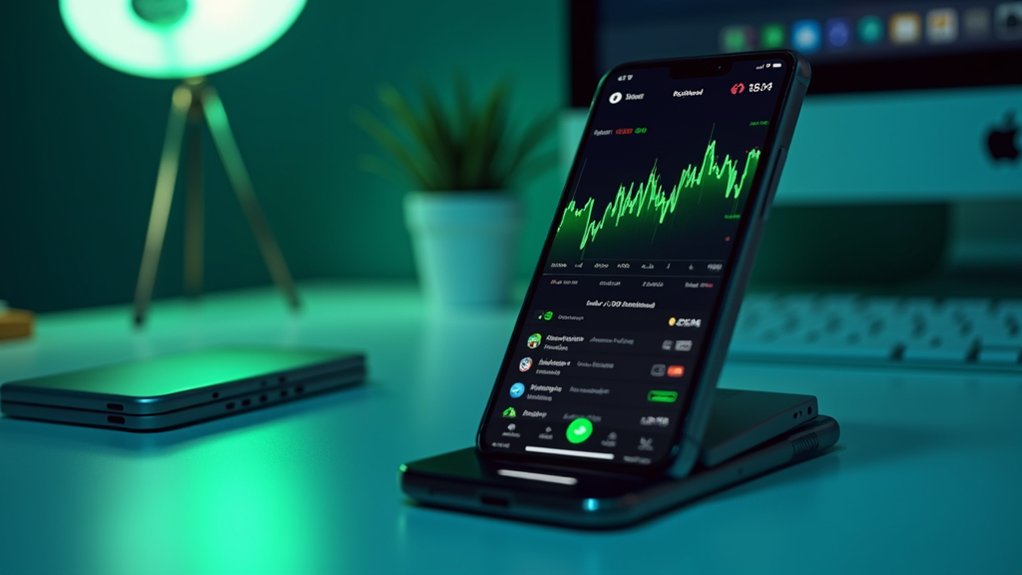To purchase Kasta crypto, investors must select a compatible exchange like Bybit, gate.io, MEXC, or Kriptomat. After completing registration and KYC verification, users deposit funds via bank transfer or credit card, maneuver to the KASTA trading pair section, and execute their purchase at approximately $0.01441 per token. A $1,000 investment currently yields about 69,409 KASTA tokens. Post-acquisition, tokens can be stored on the exchange or transferred to external wallets for enhanced security. Proper risk assessment remains essential for managing this volatile asset class.

Maneuvering the cryptocurrency market requires investors to understand specific acquisition processes, particularly when purchasing emerging tokens like KASTA. Several reputable cryptocurrency exchanges currently support KASTA transactions, including Bybit, gate.io, MEXC, and Kriptomat, each offering varying features such as user-friendly interfaces, secure storage solutions, and customer support options.
Prior to initiating any purchase, prospective buyers must verify whether their chosen platform accepts users from their jurisdiction and aligns with their specific trading requirements, since regulatory restrictions vary considerably across regions.
Establishing a realistic investment budget constitutes an essential preliminary step, with current KASTA prices hovering around $0.01441 per token. At this valuation, a $1,000 investment yields approximately 69,409 KASTA tokens, while more modest allocations of $100 provide approximately 694 tokens. Kriptomat enforces a minimum purchase amount of 25 EUR for any Kasta transaction.
Budget wisely before investing in KASTA, where $1,000 currently buys 69,409 tokens at $0.01441 each.
Financial advisors consistently emphasize the paramount importance of risk management, advising investors never to allocate funds they cannot afford to lose, especially given the notorious volatility characteristic of cryptocurrency markets. Technical analysis indicates KASTA is trading above both the 200-day SMA and 50-day SMA, potentially signaling bullish momentum.
The account setup process typically involves standard registration procedures, including email verification and phone number confirmation, followed by Know Your Customer (KYC) requirements that reveal enhanced features and higher transaction limits.
Security measures, such as two-factor authentication via applications like Google Authenticator, provide critical protection against unauthorized access. Funding options include diverse payment methods, including credit and debit cards for immediate purchases, bank transfers offering lower fees despite slower processing times, and digital payment platforms like Skrill that broaden accessibility.
Upon successful account funding, investors can navigate to the KASTA trading page, specify their desired purchase amount, and complete the transaction after reviewing associated fees and confirming details. Alternatively, some platforms offer a trading pair option where users can exchange other cryptocurrencies like BTC or ETH for KASTA.
Following acquisition, proper storage becomes imperative, with options ranging from exchange-provided wallets to external solutions like MetaMask that offer enhanced security through self-custody. Inclusive protection measures, including offline storage capabilities, regular security audits, and strict private key management, considerably mitigate theft risks while ensuring investors maintain control of their digital assets.
Frequently Asked Questions
What Is the Minimum Investment Required for Kasta Crypto?
The minimum investment required for purchasing KASTA tokens typically starts at approximately $10 for fractional ownership, with specific thresholds varying across supported exchanges like Bybit, gate.io, and MEXC.
Investors should note that this entry point enables acquisition of roughly 694-707 tokens at the current market value of $0.0144 per token, subject to exchange-specific fee structures, regional availability restrictions, and prevailing market volatility conditions.
Is Kasta Crypto Available in All Countries?
Kasta crypto is not universally available across all countries, since its accessibility varies considerably by region due to exchange restrictions.
Centralized exchanges like Bybit, gate.io, and MEXC support KASTA trading but operate under jurisdictional limitations, while decentralized exchanges potentially offer broader access dependent on wallet compatibility.
Regional payment method restrictions further limit availability, with certain platforms excluding KASTA entirely from their offerings in compliance with local regulatory frameworks.
Can I Store Kasta in Hardware Wallets?
Kasta tokens can be stored in hardware wallets, primarily through third-party applications.
Ledger Nano X/S Plus supports Kasta via connections with MyCrypto and MetaMask, while Trezor Model One/T provides compatibility through MyEtherWallet.
Users must verify that their hardware wallet supports the Matic/Polygon network, since Kasta isn't natively supported by all devices.
WalletConnect functionality enables mobile management, with offline private key storage offering enhanced security against phishing attacks.
What Are the Transaction Fees for Kasta Transfers?
KASTA transfers on the Ka.app platform incur zero transaction fees, representing a significant advantage over traditional exchanges.
Built on the Polygon Layer 2 network, KASTA benefits from ultra-low network costs, typically below $0.001 per transaction.
While external exchanges like MEXC, Bybit, and gate.io impose varying withdrawal fees when transferring KASTA to external wallets, the platform itself maintains fee-free transfers for KASTA, BTC, ETH, and stablecoins between users, regardless of network demand fluctuations.
Does Kasta Offer Staking Rewards?
Kasta offers staking rewards through its native Ka.app platform, providing up to 8% additional KASTA tokens via locked staking mechanisms.
The ecosystem implements a tiered reward structure, granting users fee discounts and governance rights based on staking duration and amount.
While not listed on major staking platforms, KASTA can generate approximately 5% APR through lending on select exchanges, with rewards directly contributing to the network's security and overall ecosystem value.









